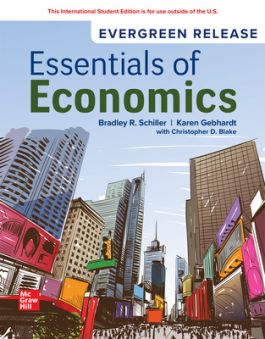Essentials of Economics: 2025 Release ISE
1265236100
·
9781265236106
Make economics relevant, engaging, and applicable to students' lives with Essentials of Economics. The 2025 Release delivers a refined approach to teaching economics, distilling core concepts to their essence for one-semester survey courses. Focuse…
Read More
Section I: BASICS
1. THE CHALLENGE OF ECONOMICS
2. THE U.S. ECONOMY 3. SUPPLY AND DEMAND
Section II: MICROECONOMICS
4. CONSUMER DEMAND
5. SUPPLY DECISIONS 6. COMPETITION
7. MONOPOLY
8. THE LABOR MARKET
9. GOVERNMENT INTERVENTION IN THE MICROECONOMY
Section III: MACROECONOMICS
10. THE BUSINESS CYCLE
11. AGGREGATE SUPPLY AND DEMAND
12. FISCAL POLICY
13. MONEY AND BANKS 14. MONETARY POLICY
15. ECONOMIC GROWTH
Section IV: INTERNATIONAL
16: INTERNATIONAL TRADE
Section V: CAPSTONE
17: THEORY VERSUS REALITY
1. THE CHALLENGE OF ECONOMICS
2. THE U.S. ECONOMY 3. SUPPLY AND DEMAND
Section II: MICROECONOMICS
4. CONSUMER DEMAND
5. SUPPLY DECISIONS 6. COMPETITION
7. MONOPOLY
8. THE LABOR MARKET
9. GOVERNMENT INTERVENTION IN THE MICROECONOMY
Section III: MACROECONOMICS
10. THE BUSINESS CYCLE
11. AGGREGATE SUPPLY AND DEMAND
12. FISCAL POLICY
13. MONEY AND BANKS 14. MONETARY POLICY
15. ECONOMIC GROWTH
Section IV: INTERNATIONAL
16: INTERNATIONAL TRADE
Section V: CAPSTONE
17: THEORY VERSUS REALITY
Make economics relevant, engaging, and applicable to students' lives with Essentials of Economics. The 2025 Release delivers a refined approach to teaching economics, distilling core concepts to their essence for one-semester survey courses. Focused on the fundamental questions, WHAT, HOW, and FOR WHOM to produce, this release presents economic theories through the lens of current global institutions, policy debates, and developments. Fully integrated with McGraw Hill’s Connect platform, the text features the latest digital resources designed to boost student engagement and success. Key topics like perfect competition, monopoly, and the aggregate supply-demand framework are presented with clarity, supported by classical, Keynesian, and monetarist perspectives. Critical thinking is at the forefront, encouraging students to understand how economic systems shape outcomes and why the right policies matter for economic prosperity.

